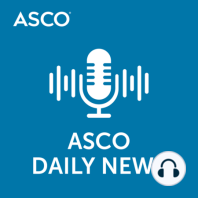14 min listen
Advances in Breast Cancer With Dr. Hope Rugo
FromASCO Daily News
ratings:
Length:
44 minutes
Released:
Jun 18, 2021
Format:
Podcast episode
Description
Dr. Hope Rugo, professor of medicine and director of Breast Oncology and Clinical Trials Education at the University of California, San Francisco Helen Diller Comprehensive Cancer Center, highlights key studies in breast cancer featured at the 2021 ASCO Annual Meeting. Transcript: ASCO Daily News: Welcome to the ASCO Daily News podcast. I'm Geraldine Carroll, a reporter for the ASCO Daily News. My guest today is Dr. Hope Rugo. She is a professor of medicine and the director of Breast Oncology and Clinical Trials Education at the Helen Diller Family Comprehensive Cancer Center at the University of California, San Francisco. Dr. Rugo joins me to discuss key advances in the breast cancer field featured at the 2021 ASCO Annual Meeting. Dr. Rugo has received research support for clinical trials through the University of California from Pfizer, Merck, Novartis, Lilly, Roche, and other organizations. Her full disclosures are available on the transcript of this episode at asco.org/podcasts. Dr. Rugo, it's great to have you on the podcast today. Dr. Hope Rugo: Oh, it's great to be here. ASCO Daily News: There were many interesting studies in breast cancer featured at the Annual Meeting. Thank you for being here to highlight some of them. Let's start with the OlympiA trial. This is LBA1. This remarkable study found that adjuvant olaparib extends disease-free survival in BRCA-mutated early stage HER2-negative breast cancer. What can you tell us about this trial? Dr. Hope Rugo: Well, this is really such an amazing study, in terms of the results and its practice-changing impact. The study actually kind of interestingly was published in the New England Journal [of Medicine] 2 days before it was presented. And even though we had all seen the data, it was really such a, I think, moving presentation in terms of really changing the face of treatment for women and men with BRCA1 and BRCA2 associated breast cancer. Of course, olaparib and talazoparib are both PARP inhibitors that are approved to treat metastatic breast cancer associated with BRCA1 and BRCA2 mutations. And in those randomized trials, they showed improvement in response and progression-free survival, but not clear differences in overall survival. So, of course, when we have an impact in the metastatic setting, the next step is to move into early-stage breast cancer. But that's quite a challenge given the fact that you have to test and find the mutation, which is challenging in some parts of the world. And then you have to decide which group of patients need more than standard therapy. So the OlympiA trial randomly assigned patients who had pathogenic BRCA1 or BRCA2 mutations and HER2-negative, either hormone receptor-positive or triple negative breast cancer, to receive a year of olaparib or a placebo. And the patient eligibility was further defined. If you had triple negative breast cancer, you could have had any residual disease after neoadjuvant therapy, or you had to have a tumor greater than two centimeters or a positive node. If you have hormone receptor-positive disease keeping in mind the benefit of adjuvant endocrine therapy. If you didn't have a pathologic complete response to neoadjuvant therapy, you had to have a few other high-risk features using the CPS plus EG score. And if you received adjuvant therapy, you had to have four or more positive nodes, so stage III disease. All patients had to have received at least six cycles of chemotherapy, radiation as indicated, and of course, hormone therapy was given for hormone receptor-positive disease. There were over 1,800 patients randomly assigned, which was pretty, I think, impressive given the fact that everybody had to be tested. And the whole idea behind the trial is that you would enroll a group of patients who still had a high residual risk of recurrence, even though you got standard and reasonable adjuvant or neoadjuvant therapy. It's important to keep in mind when you think about the results of this trial is that h
Released:
Jun 18, 2021
Format:
Podcast episode
Titles in the series (100)
Addressing Gender Disparities In The Global Oncology Workforce and Sexual Harassment: On today’s episode, Dr. Pamela Kunz, director of the Center for Gastrointestinal Cancers at the Yale School of Medicine, and vice chief of Diversity, Equity and Inclusion for Medical Oncology at Yale, discusses compelling sessions from the 2021 ASCO... by ASCO Daily News
